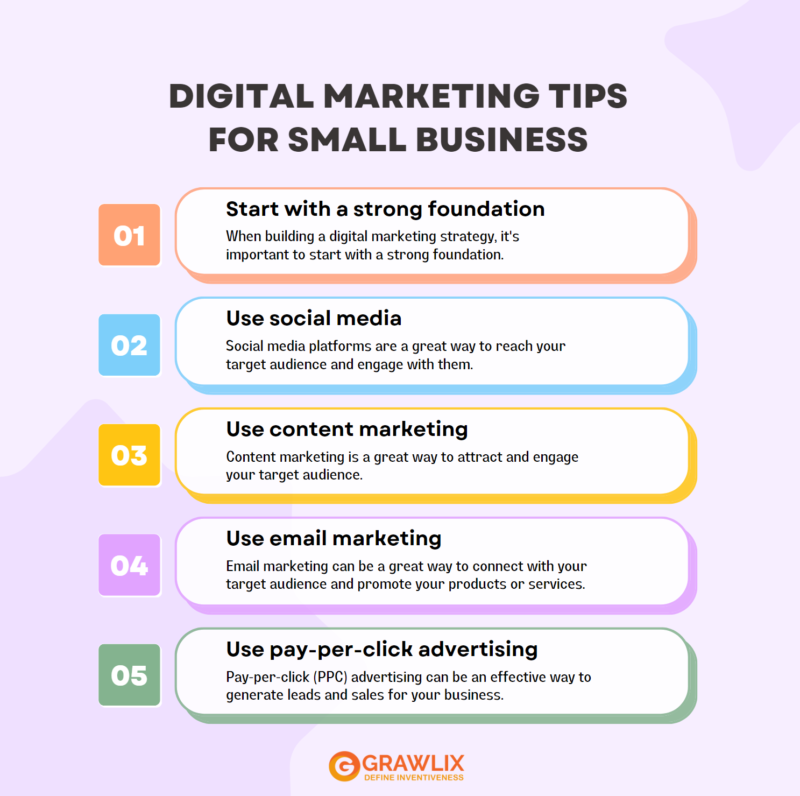In the fast-paced digital landscape, small businesses face unique challenges when it comes to establishing an impactful online presence. However, with the right digital marketing strategies, these challenges can be transformed into opportunities for growth and success. In this article, we’ll explore some SEO-friendly digital marketing tips specifically crafted for small businesses.
Start with a Solid Foundation:
A robust online presence begins with a well-optimized website. Ensure your website is not only visually appealing but also user-friendly and mobile-responsive. Implementing proper SEO techniques, such as keyword optimization, meta tags, and a sitemap, will enhance your site’s visibility on search engines.
Define Your Goals: Before diving into digital marketing efforts, clearly define your business goals. Whether it’s increasing brand awareness, driving website traffic, or boosting sales, having a clear set of objectives will guide your strategy.
Utilize Content Marketing:
Blogging for Authority: Content is king, and for small businesses, blogging is a potent tool. Regularly publishing relevant and valuable content on your blog establishes your authority in the industry and attracts organic traffic. Focus on addressing the pain points of your target audience through informative articles.
Visual Appeal: Incorporate visual elements like images, infographics, and videos into your content. Visuals not only make your content more engaging but also increase shareability across social media platforms.
Harness the Power of Social Media:
Choose Wisely: Identify the social media platforms where your target audience is most active. Whether it’s Facebook, Instagram, Twitter, or LinkedIn, tailor your approach to each platform to maximize your reach.
Consistent Presence: Maintain a regular posting schedule to keep your audience engaged. Social media is not just about promotion; it’s about building a community. Respond promptly to comments and messages to foster a connection with your audience.
Optimize Email Marketing:
Build Your List: Encourage website visitors to subscribe to your newsletter. Offer incentives such as exclusive content or discounts to entice users to share their email addresses.
Segmentation and Personalization: Segment your email list based on user behavior and demographics. Personalize your emails to provide targeted and relevant content, increasing the chances of conversion.
Automation for Efficiency: Implement automation for tasks like welcome emails, follow-ups, and abandoned cart reminders. Automation not only saves time but ensures consistent communication with your audience.
Embrace Pay-Per-Click Advertising:
Target with Precision: Define your target audience meticulously to create highly targeted PPC ads. Use keyword research to ensure your ads reach the right audience at the right time.
Budget Smartly: Set a realistic budget and monitor your PPC campaigns regularly. Analyze the performance of your ads and adjust your strategy to maximize the return on investment.
Local SEO for Local Impact:
Google My Business: Claim and optimize your Google My Business listing. This is crucial for local searches and ensures that your business appears on Google Maps, making it easy for local customers to find you.
Local Keywords: Incorporate local keywords in your website content. This will not only improve your visibility in local search results but also help you connect with a geographically targeted audience.
Encourage Customer Reviews:
Online Reputation Management: Encourage satisfied customers to leave positive reviews on platforms like Google, Yelp, and industry-specific review sites. Respond professionally to both positive and negative reviews to show your commitment to customer satisfaction.
Analytics and Measurement:
Implement Analytics Tools: Use tools like Google Analytics to track website performance and user behavior. Analyze the data regularly to make informed decisions and optimize your digital marketing strategy.
Data-Informed Decisions: Let data guide your decisions. Identify trends, monitor key performance indicators, and adapt your strategies based on the insights gleaned from analytics tools.
Collaborate and Network:
Partnerships Matter: Explore partnerships with other small businesses or influencers in your niche. Cross-promotions and collaborations can broaden your reach and introduce your brand to new audiences.
Local Engagement: Participate in local events or sponsorships to increase brand visibility within your community. Networking with other businesses and local influencers can open doors to valuable connections.
Stay Updated in a Dynamic Landscape:
Industry Trends: Keep a finger on the pulse of the latest trends in digital marketing. Subscribe to industry newsletters, attend webinars, and stay informed about emerging technologies that could benefit your business.
Adaptability: Be adaptable. The digital landscape is ever-evolving, and being open to new strategies and technologies will keep your small business ahead of the curve.
In conclusion, these digital marketing tips are tailored to empower small businesses on their journey to digital success. By building a strong foundation, leveraging content marketing, utilizing social media, optimizing email marketing, embracing PPC advertising, and staying informed, small businesses can thrive in the competitive digital arena. Remember, consistency, creativity, and adaptability are the keys to unlocking the full potential of your digital marketing efforts.


